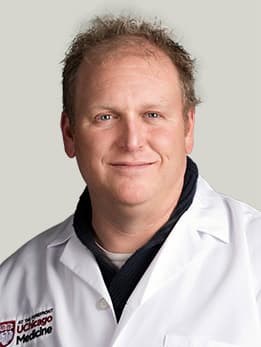UChicago Medicine introduces groundbreaking, next-generation robotic technology to combat early lung cancer

The University of Chicago Medicine is the first U.S. hospital to use new, state-of-the-art robotic technology for bronchoscopies that will improve early detection of lung cancer.
UChicago Medicine performed its first four successful cases using the Noah Medical Galaxy Robot on May 18, 2023. Each patient returned home the same day after the procedure.
The robot’s most unique feature is its X-ray-enhanced nodule-targeting system. During a bronchoscopy, a long tube with a small camera (scope) is guided through the mouth of a patient under anesthesia. The physician uses a handheld device – similar to a video game controller –to navigate the scope through the lungs.
With the robot’s help, the scope can reach potentially cancerous lung nodules and lesions in hard-to-reach places with far more precision and accuracy than current, first-generation robotic scopes, said UChicago Medicine pulmonologist D. Kyle Hogarth, MD, an expert in advanced bronchoscopy.
“I can’t stress how much this new, upgraded technology matters," Hogarth said.
"Even with the first-generation robotic scopes, bronchoscopists might miss a nodule. Now I know exactly where to put that biopsy needle and I get confirmation from the system that the needle is in the right place,” he said.
This will be helpful to anyone with an abnormal CT scan to determine what’s wrong and what we can do next.“This will be helpful to anyone with an abnormal CT scan to determine what’s wrong and what we can do next. If a biopsy is needed, we’ll make sure it’s done correctly.”
The new technology reduces exposure to radiation and less time under anesthesia, making for quicker recoveries. It also offers a faster answer to the “Is it cancer?” question.
“If there’s a way to take better care of patients with less risks and better outcomes, we’re going to do it,” Hogarth said.
The device uses a disposable bronchoscope, a unique feature designed for one-time use. This reduces the odds of infection or disease transmission from cleaned yet reused scopes, the U.S. standard before the Galaxy.
Hogarth has been a paid consultant since 2018 for the robot’s manufacturer, Noah Medical, and has an equity interest in the company. The Galaxy robot system was first used in March 2023 in Australia. The U.S. Food & Drug Administration cleared it for use the same month.
In 2018, UChicago Medicine was the second hospital in the nation – and first in the Midwest – to use a robotic bronchoscopy tool. Since then, Hogarth has worked as a consultant with this company to advance its navigational and diagnostic features.
Hogarth envisions a future where bronchoscopies will include therapeutics.
“The day is coming where – during a bronchoscopy – I can confirm if you have lung cancer, and if so, I will try to jump-start your immune system with other technologies or I will try to cure your lung cancer from the inside,” he said.
“Imagine walking out from your bronchoscopy cured of your lung cancer. That day is coming. And it’ll be outpatient. It’s not here yet, but it’s closer to happening because of technologies like this.”

UChicago Medicine Comprehensive Cancer Center
UChicago Medicine is designated as a Comprehensive Cancer Center by the National Cancer Institute, the most prestigious recognition possible for a cancer institution. We have more than 200 physicians and scientists dedicated to defeating cancer.
Learn More About the Comprehensive Cancer Center
D. Kyle Hogarth, MD
D. Kyle Hogarth, MD, is an expert in pulmonary diseases — including lung cancer and alpha-1 antitrypsin (AAT) deficiency. He is an expert in the minimally invasive diagnosis, management and staging of lung cancer through bronchoscopy. He is a leader in advanced bronchoscopy using electromagnetic navigation systems that employ 3D imaging technology to detect and biopsy lung nodules and masses.
Read Dr. Hogarth's physician profile.